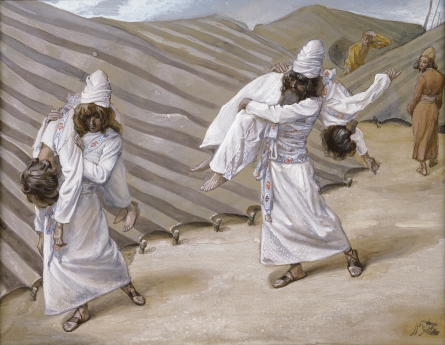James Tissot: The Dead Bodies Carried Away (c. 1896-1902)
Parashat Shemini: The God of Winter
Rabbi Yehuda Hausman
A winter’s sun can give off much light but little warmth.
The day may be radiant with bright snow and brilliant sky, but still we plod along
with our shoulders pinched, teeth clenched, gloved hands buried deep in our pockets.
Holiness can often feel like the sun in December, akin a menorah, we seem not meant to benefit but to ache for its light
and, more so, its heat.
It is evident from this week’s Torah portion that Nadav and
Avihu must have pined for holiness. It was not enough that they were priests
and thus they ranked among the elders of Israel (Lev. 9.1). It did not suffice
that they assisted their father, Aaron the High Priest, on the sacred day of
the Tabernacle’s inauguration. From the beginning of the Torah portion, we are
told pointedly and repeatedly of their full participation on that auspicious
day. ‘They brought the blood… and delivered to Aaron the burnt offering...’
(Lev. 9.1,8-20). Still they yearned to draw closer. So the sons of Aaron, “took
each his censer, and placed in them fire and laid incense upon it; and they brought-near alien fire before the Lord” (Lev. 10.1).
What happens next is strange on many counts. “And there came
forth fire from before the Lord, and
consumed them, so they died before the Lord” (10.2) It is not clear if this
fire comes down from heaven, or emerges from the Holy of Holies. What is clear
is that this second fire differs drastically from the first fire mentioned just
a few verses above: “A fire went out from before the Lord to consume upon the
altar the burnt-offering and fats” (9.24). This first flame contained heat, so
much heat, that the day’s offerings, which had been roasting slowly on the altar’s
normal flames, were consumed in an instant (R. Dovid Tzvi Hoffman).
In contrast, the flames that consume Aaron’s sons contain no
heat. Each soul is devoured but it is a fire that leaves flesh and garments intact.
Moses instructs two Levite cousins to remove the bodies from the Sanctuary, “So
they drew near, and carried them by their tunics out of the camp” (10:5). There
is no singed garments or seared skin. (See Rashi.) The tragic turn of events
drips with irony. Aaron’s sons sought unsanctioned fire to “warm” themselves; measure-for-measure,
the fire that took them was devoid of any heat.
If we consider the nature of holiness in the Torah, it consistently
suggests hierarchy and degradations, the further away we stand the less intense
the flame. God descends to Mt. Sinai in fire (Ex. 19.18). Someway down the
mountain, Moses stands between God and the Elders, the Elders, in turn, stand
between Moses and Israel, and the camp of Israel forms a boundary between the
Mountain and mankind. The Sanctuary is no different. There is a courtyard
around God’s dwelling place. The Levites encircle the courtyard and Tent of
Meeting. The Israelite camp forms a ring around the Levites, and around Israel,
there dwells the great mass of humanity. In our day, we think of the hierarchy as
‘Temple, Jerusalem, Promised Land, and Diaspora.’ But even the animal kingdom
is divvied up in Leviticus. All of humanity can enjoy every kind of fish or
fowl, critter or quadruped. But judging by the list rendered at the end of Parashat Shemini, only a tenth of those can be eaten by Israel, and of that
tenth only a small portion is rendered fit as a sacrifice before the Lord. Clearly,
proximity would mean a great deal, as God’s aura emanates from a central place.
But before we conclude thus, consider Nadav and Avihu, who even before the
presence of the Lord felt a sort of chill.
Such may be the strange fire of Godliness, near yet apart; the
bush burns but does not burn; once, Israel experienced a fire upon the mountain,
but the mountain was not ablaze. Long ago, there was an eight-day miracle, the wicks
drew oil, formed teardrop flames, hour-upon-hour passed, but the wicks were not
consumed.
If one message may be derived from our studies, perhaps it
is this. We can only prepare ourselves for holiness, akin the Israelites who
cleansed themselves, in body and spirit, before Revelation; or through careful
ritual, as the priests and people performed before the Sanctuary’s Inauguration.
In the meanwhile, till that bright light suddenly erupts in warmth, there is only
the longing, as winter waits for spring.
